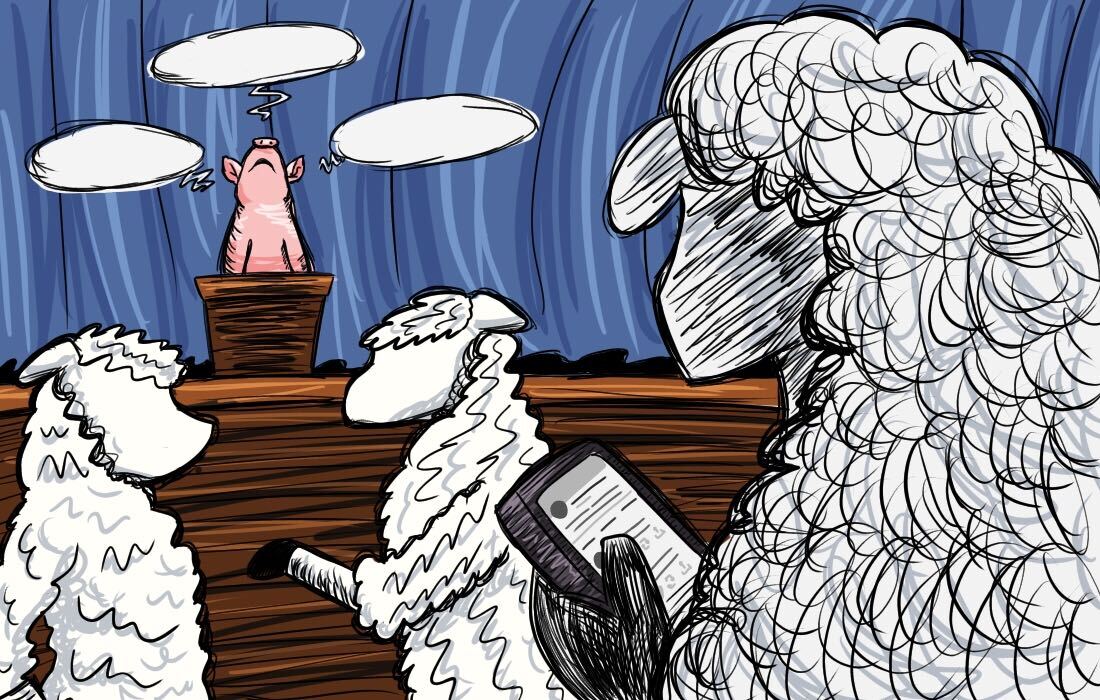
I recently read the book Animal Farm by George Orwell, an author well known for criticizing the use of language in his books. Afterwards, I found myself thinking about two political events that occurred recently, which were the protests in Ottawa and the war between Ukraine and Russia. While the two events differed significantly, a common theme emerged — I found that the language used by Canada and Russia’s leaders was anti-Semitic and served only to further their goals.
Prime Minister Justin Trudeau opposed the Freedom Convoy protests that took place in Ottawa in Jan. and Feb. against the COVID-19 vaccine mandate imposed by the government. However, it was not this initial reaction by the prime minister that had me deep in thought. It was his words during a session of parliament on Feb. 16 that was on my mind.
In this session, Melissa Lantsman, an MP from the Conservative Party of Canada, asked Trudeau a question concerning his past rhetoric toward protests. Trudeau responded by accusing the Conservative Party of Canada — including Lantsman — of standing “with people who wave swastikas.”
I believe that Trudeau’s language toward Lantsman is not only disrespectful but shameful, given Lantsman’s background — she is of Jewish descent and has been previously outspoken against the Holocaust.
Despite Lantsman’s background and heritage, Trudeau offered no apology for what he said despite encouragement from other MPs to do so.
Separately, another situation in which political language was used in an anti-Semitic manner was in the speech that Vladimir Putin made before invading Ukraine on Feb. 24.
In this speech, Putin claimed that there were neo-Nazis overrunning Ukraine and that Russia had to intervene to remove them from power. This upset me because it is a boldfaced lie. There is no evidence that the Nazis are in control of Ukraine. Furthermore, Ukrainian prime minister Volodymyr Zelenskyy is of Jewish descent, which made Putin’s comments even more offensive.
Imagine if American President Joe Biden said that Canada was overrun by Nazis and that America needed to invade Canada to liberate it from the Nazis. It sounds ridiculous, but I also think that it’s a sound parallel to the logic that Putin used.
I’m also willing to bet that there would be people in the world who would support Biden similarly to those who support Putin.
The implications of such anti-Semitic language have negative effects. For example, the language that Trudeau used in Parliament further divided the general population. Because of the increased attention on Trudeau’s anti-Semitic comments, attention was diverted from the government’s handling of the protests, which was the original discussion at hand.
Another example of the implications of the negative effects of divisive language is the justification of war between Ukraine and Russia as a result of Putin’s anti-Semitic speech. For example, there have been people on social media supporting what I believe is the unjustifiable invasion of Ukraine. It has also caused Russian soldiers to stand by their country and help in the invasion as they genuinely believed that Nazism was in control in Ukraine.
To go back to where I started this train of thought, Orwell always advocated for freedom of language and tried to warn people about the dangers of leaders using language for their own gains.
I believe that it is important to never forget this message during a time when leaders, twice in the recent past, have used language to their benefit while also disseminating harmful anti-Semitic messages. If we do not remain vigilant, I believe that we may become victims of misinformation, which is the very thing Orwell was trying to prevent.
—
This op-ed was written by a University of Saskatchewan undergraduate student and reflects the views and opinions of the writer. If you would like to write a reply, please email opinions@thesheaf.com. Cameron Stanger is a second-year undergraduate student studying Chemistry. He is a neurodivergent person on the Autism Spectrum who has been involved in advocating for inclusion since Aug. 2016. This work has given him an appreciation for the power and importance of the use of language by people.
Graphic: Rellie Mananzan
Leave a Reply